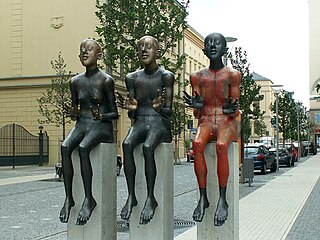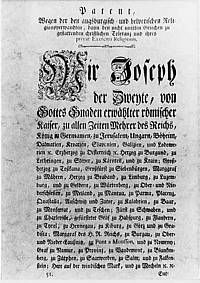
The Act of Settlement is an Act of the Parliament of England that settled the succession to the English and Irish crowns to only Protestants, which passed in 1701. More specifically, anyone who became a Roman Catholic, or who married one, became disqualified to inherit the throne. This had the effect of deposing the remaining descendants of Charles I, other than his Protestant granddaughter Anne, as the next Protestant in line to the throne was Sophia of Hanover, a granddaughter of James VI and I from his most junior surviving line, with the crowns descending only to her non-Catholic heirs. Sophia died shortly before the death of Queen Anne, and Sophia's son succeeded to the throne as King George I, starting the Hanoverian dynasty in Britain.
Civil and political rights are a class of rights that protect individuals' freedom from infringement by governments, social organizations, and private individuals. They ensure one's entitlement to participate in the civil and political life of society and the state without discrimination or repression.

The Maryland Toleration Act, also known as the Act Concerning Religion, the first law in North America requiring religious tolerance for Christians. It was passed on April 21, 1649, by the assembly of the Maryland colony, in St. Mary's City in St. Mary's County, Maryland. It created one of the pioneer statutes passed by the legislative body of an organized colonial government to guarantee any degree of religious liberty. Specifically, the bill, now usually referred to as the Toleration Act, granted freedom of conscience to all Christians. Historians argue that it helped inspire later legal protections for freedom of religion in the United States. The Calvert family, who founded Maryland partly as a refuge for English Catholics, sought enactment of the law to protect Catholic settlers and those of other religions that did not conform to the dominant Anglicanism of Britain and her colonies.

The Edict of Nantes was signed on 13 April 1598 by King Henry IV and granted the Calvinist Protestants of France, also known as Huguenots, substantial rights in the nation, which was predominantly Catholic. In the edict, Henry aimed primarily to promote civil unity. The edict separated civil from religious unity, treated some Protestants for the first time as more than mere schismatics and heretics and opened a path for secularism and tolerance. In offering a general freedom of conscience to individuals, the edict offered many specific concessions to the Protestants, such as amnesty and the reinstatement of their civil rights, including the right to work in any field, even for the state, and to bring grievances directly to the king. It marked the end of the French Wars of Religion, which had afflicted France during the second half of the 16th century.

Religious toleration may signify "no more than forbearance and the permission given by the adherents of a dominant religion for other religions to exist, even though the latter are looked on with disapproval as inferior, mistaken, or harmful". Historically, most incidents and writings pertaining to toleration involve the status of minority and dissenting viewpoints in relation to a dominant state religion. However, religion is also sociological, and the practice of toleration has always had a political aspect as well.
An edict of toleration is a declaration, made by a government or ruler, and states that members of a given religion will not be persecuted for engaging in their religious practices and traditions. The edict implies tacit acceptance of the religion rather than its endorsement by the ruling power.
Catholic emancipation or Catholic relief was a process in the kingdoms of Great Britain and Ireland, and later the combined United Kingdom in the late 18th century and early 19th century, that involved reducing and removing many of the restrictions on Roman Catholics introduced by the Act of Uniformity, the Test Acts and the penal laws. Requirements to abjure (renounce) the temporal and spiritual authority of the pope and transubstantiation placed major burdens on Roman Catholics.

Succession to the British throne is determined by descent, sex, legitimacy, and religion. Under common law, the Crown is inherited by a sovereign's children or by a childless sovereign's nearest collateral line. The Bill of Rights 1689 and the Act of Settlement 1701 restrict succession to the throne to the legitimate Protestant descendants of Sophia of Hanover who are in "communion with the Church of England". Spouses of Catholics were disqualified from 1689 until the law was amended in 2015. Protestant descendants of those excluded for being Roman Catholics are eligible.
The right to freedom of religion in the United Kingdom is provided for in all three constituent legal systems, by devolved, national, European, and international law and treaty. Four constituent nations compose the United Kingdom, resulting in an inconsistent religious character, and there is no state church for the whole kingdom.
The Interregnum was the period between the execution of Charles I on 30 January 1649 and the arrival of his son Charles II in London on 29 May 1660 which marked the start of the Restoration. During the Interregnum, England was under various forms of republican government.

The 1782 Edict of Tolerance was a religious reform of Emperor Joseph II during the time he was emperor of the Habsburg monarchy as part of his policy of Josephinism, a series of drastic reforms to remodel Austria in the form of the ideal Enlightened state. Joseph II's enlightened despotism included the Patent of Toleration, enacted in 1781, and the Edict of Tolerance in 1782. The Patent of Toleration granted religious freedom to the Lutherans, Calvinists, and Serbian Orthodox, but it was not until the 1782 Edict of Tolerance that Joseph II extended religious freedom to the Jewish population.

James II was King of England and King of Ireland, and King of Scotland as James VII from the death of his elder brother, Charles II, on 6 February 1685. He was deposed in the Glorious Revolution of 1688. He was the last Catholic monarch of England, Scotland, and Ireland. His reign is now remembered primarily for conflicts over religious tolerance, but it also involved struggles over the principles of absolutism and the divine right of kings. His deposition ended a century of political and civil strife in England by confirming the primacy of the English Parliament over the Crown.

The Roman Catholic Relief Act 1791 is an Act of the Parliament of Great Britain passed in 1791 relieving Roman Catholics of certain political, educational, and economic disabilities. It admitted Catholics to the practice of law, permitted the exercise of their religion, and the existence of their schools. On the other hand, chapels, schools, officiating priests and teachers were to be registered, assemblies with locked doors, as well as steeples and bells to chapels, were forbidden; priests were not to wear vestments or celebrate liturgies in the open air; children of Protestants were not to be admitted to the schools; monastic orders and endowments of schools and colleges were prohibited.

The Equality Act 2010 is an Act of Parliament of the United Kingdom passed during the Brown ministry with the primary purpose of consolidating, updating and supplementing the numerous prior Acts and Regulations, that formed the basis of anti-discrimination law in mostly England, Scotland and Wales; some sections also apply to Northern Ireland. These consisted, primarily, of the Equal Pay Act 1970, the Sex Discrimination Act 1975, the Race Relations Act 1976, the Disability Discrimination Act 1995 and three major statutory instruments protecting discrimination in employment on grounds of religion or belief, sexual orientation and age.
Jewish disabilities were legal restrictions, limitations and obligations placed on European Jews in the Middle Ages. In Europe, the disabilities imposed on Jews included provisions requiring Jews to wear specific and identifying clothing such as the Jewish hat and the yellow badge, paying special taxes, swearing special oaths, living in certain neighbourhoods, and forbidding Jews to enter certain trades. In Sweden, for example, Jews were forbidden to sell new pieces of clothing. Disabilities also included special taxes levied on Jews, exclusion from public life, restraints on the performance of religious ceremonies, and linguistic censorship. Some countries went even further and outright expelled Jews, for example England in 1290 and Spain in 1492.

Human rights in Canada have come under increasing public attention and legal protection since World War II. Prior to that time, there were few legal protections for human rights. The protections which did exist focused on specific issues, rather than taking a general approach to human rights.

Anti-Catholicism in the United Kingdom dates back to Roman times. Attacks on the Church from a Protestant angle mostly began with the English and Irish Reformations which were launched by King Henry VIII and the Scottish Reformation which was led by John Knox. Within England, the Act of Supremacy 1534 declared the English crown to be "the only supreme head on earth of the Church in England" in place of the Pope. Any act of allegiance to the latter was considered treasonous because the papacy claimed both spiritual and political power over its followers. Ireland was brought under direct English control starting in 1536 during the Tudor conquest of Ireland. The Scottish Reformation in 1560 abolished Catholic ecclesiastical structures and rendered Catholic practice illegal in Scotland. Today, anti-Catholicism remains common in the United Kingdom, with particular relevance in Scotland and Northern Ireland.

The Toleration Act 1688, also referred to as the Act of Toleration, was an Act of the Parliament of England. Passed in the aftermath of the Glorious Revolution, it received royal assent on 24 May 1689.

The Succession to the Crown Act 2013 is an Act of the Parliament of the United Kingdom that altered the laws of succession to the British throne in accordance with the 2011 Perth Agreement. The Act replaced male-preference primogeniture with absolute primogeniture for those in the line of succession born after 28 October 2011, which means the eldest child, regardless of gender, precedes any siblings. The Act also repealed the Royal Marriages Act 1772, ended disqualification of a person who married a Roman Catholic from succession, and removed the requirement for those outside the first six persons in line to the throne to seek the Sovereign's approval to marry. It came into force on 26 March 2015, at the same time as the other Commonwealth realms implemented the Perth Agreement in their own laws.
Four million people in Australia (18.5%) reported having a disability in 2009, according to the results of the Survey of Disability, Ageing and Carers. Males and females were similarly affected by disability.












